A new patent from Google details an AI-based gaming system that aims to automate the process of game quality assurance and testing. As many video game QA teams around the world continue to unionize to protect their rights, one of the largest and most valuable companies seems to be looking for a way to further automate the video game QA process.
According to Google’s patent, the number of glitches in games at launch is the fault of testing teams who can’t handle the size and scope of modern games. “Game testing is a mostly manual process, heavily reliant on humans playing games repeatedly and looking for defects,” the patent says. “Unfortunately, these teams can no longer scale with the complexity of modern games, leading to delayed releases and lower quality products.”
Google says its new “Gameplay Trainer system provides game developers with a solution that’s useful, flexible, trainable, and able to progress toward goals rather than just ‘winning’ in a game application.” This is important because testers often look for issues that arise as a result of unusual ways of playing, so a system that simply determined the optimal way to succeed in the game would likely miss these issues.
Next, the patent (via Very Ali Gaming) describes how systems can be trained to perform game actions in real time, generating observational data and using it to improve their future actions and adjust them as needed for additional testing. Like other AI and machine learning tools, Google offers its game coach to keep improving the more time you spend testing a given game.
The patent comes after QA teams at several major companies formed unions, with BioWare and Raven Software’s test teams unionizing in June 2022, and workers at Microsoft’s ZeniMax studios voting to unionize in January. 2023. Notably, EA also filed a patent for a similar system in January, with subsequent reports in February that it had laid off up to 200 Apex Legends QA testers.
Quality assurance is a critical, valuable, and skillful aspect of game development that has sometimes been misunderstood or underestimated, both in terms of mass perception and within some developers and publishers. Whether and where this technology will be used remains to be seen, but for it to be announced just as labor movements that would champion its value are gaining traction on quality control is unfortunate to say the least.

